
Engaging Hearts and Minds in a Broken Culture
This discussion offers a preview of Volume #16 “Cultures in Conflict” from the That The World May Know video series, available below.
Home » Episodes » Focus on the Family Broadcast » A Captive Missionary’s Journey To Freedom (Part 2 of 2)
Preview:
Andrew Brunson: My tests were enough to knock me out of a relationship with God. And your tests are more than enough to knock you out of friendship with God as well. So, we’re tested in different ways. You know, mine was a very intense prison experience but we’re all tested in different ways but the area of the heart that is tested is the same.
End of Preview
John Fuller: Last time on Focus on the Family we heard the gripping story of how Pastor Andrew Brunson was held in prison in Turkey, falsely accused of terrorism. In his desperate situation, he did find some value in suffering, and he drew closer to God during that terrifying ordeal. We’ll hear more from Andrew and his wife, Norine, today. Your host is Focus president and author, Jim Daly, and I’m John Fuller.
Jim Daly: Uh, John, uh, this is a remarkable story, and it serves as a reminder that Christians are being persecuted, uh, for their faith in Christ around the world. In fact, Open Doors, which keeps tabs of these things, estimates that just in the last year, uh, over 340 million Christians in the world have encountered some kind of persecution. That is another good reason that in our prayer list, we should be mentioning these people to the Lord and lifting them up.
John: Hm.
Jim: And asking God to intervene. Now the irony is, today’s story, like last time, as we talked to the Brunson’s, is a story of trusting the Lord even if your circumstances aren’t reflecting blessing, or the way we think blessing should occur. Um, Pastor Brunson and his wife Norine went through terrible suffering, uh, in the imprisonment in Turkey and we’re gonna continue their powerful story today.
John: Yeah, Andrew and Norine Brunson have a ministry called Wave Starters. Uh, its work is focused on the Muslim world, uh, the persecuted church, and also preparing believers to stand strong in difficult times. Andrew’s, uh, wonderful book is called God’s Hostage: A True Story of Persecution, Imprisonment, and Perseverance.
Jim: Andrew and Norine, welcome back.
Norine Brunson: Thank you.
Andrew: Thank you.
Jim: Man, the listeners, those that heard yesterday’s program, are ready to go ’cause they wanna hear the rest of the story and if you missed it as a listener, get the download, get the smart phone app, you can get it that way or just call us and we’ll, uh, tell ya how you might (laughs) me able to listen. But it was powerful. Uh, Andrew, as we l- left off last time, uh, you’re in this overcrowded prison, uh, with other Muslim men in a cell built for eight and there’s about 20 men in this, uh, particular cell, all of whom oppose you and your faith in Christ. They’re all committed, uh, very committed Muslims. Uh, you began to get depressed, anxious. Norine was noticing that when she was able to visit you. Uh, but also, you were so desperate you’re even feeling suicidal at times. Uh, talk about how that feeling crept in and then, Norine, I’d love to hear from you as Andrew’s wife what sense of despair you were encountering. So, Andrew, what was happening there to get you to such a low point?
Andrew: So, I, I broke, and I broke repeatedly and thoroughly. (laughs) Uh, and what brought me to this point is the sense of fear that I had. Uh, all of this stress, uh, led to a lot of stress hormones being released. I couldn’t sleep, I had constant panic attacks, and I also went into relational crisis with God. I was having a spiritual crisis. And so, I felt abandoned, I felt, uh, that God had turned me over to be persecuted in, in a very harsh way, so, uh, and I was having a lot of, uh, questions of God and he wasn’t answering me. (laughs)
Jim: Right. He was quiet.
Andrew: There was no one else in my cell to answer me either.
Jim: Huh.
Andrew: I said to him once, “I might as well talk to the wall.” You know, “Talking to you is the same. I’m getting no answer.” So, I was having a lot of doubts and questions and I was very confused. Uh, I lost about 50 pounds, so I’m breaking physically-
Jim: Hm.
Andrew: … and I had a fear that my Muslim cellmates told me, “Andrew, you will become a Muslim.” And I thought I’m so confused, I’m so isolated, is it possible that over time… I never wanted to turn my back on Jesus but is it possible that over time I would drift away under the… just considering the pressure I’m under and the confusion that I have.
Jim: Yeah.
Andrew: So, wouldn’t it be better if I just go ahead and, and kill myself and go to Heaven, defeated, but at least I’m there? And it was a very wrong way of thinking but I was very confused at the time. I, I also thought I would much rather be in Heaven than in a Turkish prison for the rest of my life and they, at one point, they’d said they wanted three life sentences for me, so I didn’t know that I was gonna get out. I spent two years there, but I didn’t know it was gonna be two years. (laughs)
Jim: Right, you were… It, it was just indefinite.
Andrew: Yes. So, I thought three life sentences, I may die here. And really, it’s the uncertainty that often tests the heart.
Jim: Yeah.
John: Mm.
Jim: When you, when you, uh, contemplate that, and now you’re on the other side of that and you understand what the Lord was doing and how he was using, using you and what was happening, how do you, theologically, how do you translate that suffering? And the idea that suffering actually does involve God’s direction for many, many people and is… Y- you know, it’s the old question, if God is love and God loves me, why does he allow me to suffer?
Andrew: Yeah, there are many books written about that and to be honest, I, I had a lot of questions and my heart… What almost knocked me out was that I was deeply offended toward God. You know, you, you haven’t met my expectations, you… God’s love may look different than I expect.
Jim: Yeah.
Andrew: We talk about God’s faithfulness. His faithfulness may look different than we expect it to look, uh, and I, I had many questions, and I don’t know that I have the answers to them.
Jim: Yeah.
Andrew: But what one of the things that led to turnaround for me was when I gave up my right to demand answers.
Jim: Mm.
Andrew: I came to realize at some point I have all these questions for God and I’m questioning his faithfulness and love, and at some point, it kinda dawned on me that God has questions for me.
Jim: Yeah.
John: Hm.
Andrew: And it, it was my love and my faithfulness that were being tested-
Jim: Yeah.
Andrew: … and he’s saying, “Andrew, are you going to love me even when you don’t see my love? Are you going to be faithful to me even when you don’t see my faithfulness?”
John: Hm.
Jim: Boy, so many people are living in that spot but, Norine, I do wanna come back and get your feelings and observations as a spouse. This is potentially panic mode time, you know. You’re feeling and seeing Andrew’s depression, perhaps even talking about those suicidal thoughts.
Norine: It’s… Yeah.
Jim: How do you walk away from the prison, go back to your house-
Norine: Oh, very… So hard.
Jim: … in Turkey, and then how do you pray?
Norine: So hard.
Jim: How do you trust God that he’s gonna keep your husband safe?
Norine: Yeah, yeah. You know, the pressure, too. Each week I would make a sheet for myself. I couldn’t take anything into the prison, but I’d prepare a sheet ahead of time of any good news diplomatically, any news of the family. I’d say, “Lord, what can I bring to him this week? What can I…”
Jim: Hm.
Norine: And I would start out by praying over him every time we saw each other. There was sometimes when I didn’t have a lot of good news and I said, “Lord, when I’m feeling so discouraged, how can I begin to help him?” But at the end of the day, uh, somebody said, “Look, you are, you cannot be, bear the full responsibility for another person.” So, I said, “Okay. I’m, I’m doing the best I can and, Lord, you have to do it.”
Jim: Hm.
Norine: “You have to take care of him.” But there were times, um, that there were a couple of real low points and one of them where he said, “I can’t trust myself anymore.” I’m just, I’m concerned ’cause the panic and despair can easily lead a person just to feel suicidal. It’s not that he wanted to die, as he said, but, you know, that’s just where you’re at.
Jim: You’re looking for relief.
Norine: You’re looking for relief, yes. Um-
Andrew: I’ll tell you one thing that she said to me. She said, “Andrew, go back and repeat this again and again. ‘Andrew in Christ chooses life.’”
Norine: Yeah.
Jim: Wow.
Norine: Somebody said, “Give him some, you know, a short phrase that he can just-”
Jim: Meditate on.
Norine: Keep… Yeah. And I said, “S- you know, keep saying that, if nothing else.” I also said, “At some point, promise me that I’m gonna see you next week when I come.”
Jim: Mm, yeah.
Norine: And, um, he’d say, “Yes.” And then I thought, “Okay, I will see him next week.”
Jim: Yeah, so he’s-
Norine: So, there were some weeks… There, there was a period there where it was to that point, yeah.
Jim: Now and I, y- again, I appreciate that honesty and that openness and, uh, you know, people are gonna connect with your story in different ways. It’s a profound story, a unique story, but what you went through, people go through. You know, Andrew, a moment ago when you were talking about that despair, a couple of my friends who have lost their children to cancer or something like that, they have that feeling. “Lord, where are you?”
Norine: Yeah.
Jim: “Lord, if you’re so good, why did you take my child?”
Norine: Yeah. Yeah.
Jim: And it, y- you know, those… The giving up, the surrendering, of saying, “Okay. I don’t need an answer to that question. I’ll trust God.” That’s a profound faith moment for everybody. Anybody.
Andrew: I think most people… In many of our struggles or crises we will have some sense of God’s support, but I think most people will go through at least one crisis in their life where they feel like they’re completely in the dark and I don’t think God causes all of the difficulties, but in the midst of them, he will test us. And my test was whether when I’m in the dark, am I going to lean into him in the dark?
Jim: Yeah.
Andrew: And we do-… Sometimes people think, they say to me, “Andrew, your imprisonment was really about you trusting God.” And I had a difficult time with understanding trust because so often it’s tied to an outcome. You know, uh, people would say, “Andrew, trust God,” and really what they’re saying is, “Trust God. He’s going to get you out of prison.” But it doesn’t say anywhere in the Bible that he will, and so they way that I began to think about trust, to apply it in my life, was say, “Jesus, I believe that you are a good leader, and you will hold my heart, you’ll shepherd my heart, and you will take me through to your kingdom.” But I don’t know what difficulties I will go through. I don’t know how hard it’s gonna be. I don’t really know what that process is gonna be, but I can lean into your leadership-
Jim: Mm.
Andrew: … and say, “You’re a good leader.” And so lean into him. And this is, uh, what became my theme verse. It was from Isaiah 50:10 where God is saying to Israel that’s in exile, “To the one who walks in darkness and has no light, trust in the name of your God and lean on him.” So, he could’ve said, “I’m gonna send light. I’m gonna send light.” But he didn’t. He basically said, “You’re gonna be in darkness for a while. Lean into me in the dark.” And so, I think this is, was really the test for me. Am I going to stand? Am I going to lean into him in the darkness when I don’t sense his presence?
Jim: Mm.
John: Mm. Some great words of perspective from Andrew Brunson and his wife Norine today on Focus on the Family with Jim Daly. Um, e- uh, the story is captured in the book God’s Hostage: A True Story of Persecution, Imprisonment, and Perseverance. I might add that we have caring Christian counselors here at Focus on the Family and if what we’re talking about is resonating with you, if you’re in a dark spot, uh, in your heart and there’s no apparent way out and you need to talk to somebody, seek out a pastor. If you can’t, uh, find somebody nearby, give us a call. It’d be a privilege for us to connect you with one of those counselors. Our number’s 800, the letter A, and the word FAMILY. Or stop by focusonthefamily.com/broadcast.
Jim: We mentioned that feeling of Job and that despair out of the Old Testament, that abandonment from God, and you’re, uh, you know, you’re illustrating that so precisely. This was an ongoing battle. At that prison, Buca Prison, your final prison, um, you had your Bible once again, they allowed you to have that, and as you read… I can only imagine connecting with the apostle Paul and what he went through, being in prison singing, uh, talking to the jailers, encouraging people. How did Paul either inspire you or, you know, give you concern or maybe both?
Andrew: Well, I, I realized I was not living up to Paul’s, uh, (laughs) example-
Jim: Level. (laughing)
Andrew: … but one thing is, uh, that Paul talks about, uh, how these momentary light afflictions cannot compare with what’s coming. So, he had a, he had a-
Jim: What a great statement.
Andrew: H- yeah. He had a very, uh, good, right perspective of eternity, what really matters. I, I could just picture coming before Jesus one day and he says to me, “Andrew, I had assignments for you to accomplish and you didn’t because you were a coward.” And, uh-
Jim: Hm.
Andrew: … I began to fight every day to get to the point where I say, “I’m willing to stay here. I can’t embrace prison, but I can embrace serving your purposes.”
Jim: Hm.
Andrew: And as I did that day after day, it ended up building a strength and a determination in me.
Jim: Yeah.
Norine: You mentioned Paul singing in prison.
Jim: Yeah. (laughs)
Norine: And of course, we don’t know how he sang. Was he all happy about it or was he singing, you know, uh, praise and worship in his difficulty just out of-
Jim: Yeah.
Norine: … out of obedience and surrender and reverence for God? Uh, Andrew mentioned some of the words of the song that he actually wrote in prison, and it came out of his heart, the things that he had struggled with, and he was, it was kind of an affirmation of truth. And he sang this every day and I think that that God was just waiting every day for Andrew to start singing that.
Jim: Hm, yeah.
Norine: I think he just loved that because when you’re s-… Everybody was so happy when Andrew wrote a song and they f- felt like, “Okay, he’s done.” I knew his pain was continuing. I knew he was singing in his pain and that is the most powerful worship.
Andrew: So, something that, uh, the turning point for me, Jim, came. I made a decision that I was going to be faithful to God and that I was gonna run after him and try to rebuild my relationship. I had to fight for my relationship with him because I was losing it and the decision was, I’m gonna turn my eyes toward him and not away.
Jim: Yeah.
Andrew: And that sounds very simple but in my, in my darkness, in my worst moments, I say in, i- when I’m the weakest, I still have a decision I can make with my will. It’s not with my emotions. My emotions are in turmoil, but I can make a decision. Am I going to d- turn toward him or away? And sometimes it was just one degree in his direction. You know, “I’m so weak, I can just barely turn.” But that made all the difference because it positioned me so that then he could give grace and I could begin to cooperate with that grace. And the reason I wanna emphasize this is because y- your listeners, it doesn’t matter how deep the discouragement or depression or darkness you’re in. You can still make a decision to turn toward him, even if it’s only slightly in his direction.
Jim: Yeah.
Andrew: But it makes all the difference to turn toward him than to turn away.
Jim: Yeah, that is really well said, and, uh, man, we encourage you to do that.
John: Mm-hmm.
Jim: I mean, from a spiritual perspective-
John: Yeah.
Jim: … you’re on a better track in that regard. Um, l- let’s move to the trials and some of the practical human side of everything going on. Being in front of those judges, hearing slanderous things said about you that weren’t rooted in any kind of truth. W- what did that feel like? You’re standing in fr-… Describe it for us ’cause none of us will probably experience that.
Andrew: So, it was a kangaroo court. I knew that, uh, the judge wasn’t gonna make the decision.
Jim: Sure.
Andrew: That was going to be made at a political level so in a sense, it didn’t matter how well I defended myself. It wasn’t gonna make any difference. Uh, the setting was very intimidating. It was, uh, on a r- basketball arena. They turned it into a court to have mass, uh, uh-
Norine: Trials.
Andrew: … trials.
Jim: Huh.
Andrew: But I was sitting there alone and, uh, facing three judges who are on a, a stand across from me. In front of me. And the prosecutor sits right next to the judges so, you know, (laughs) they’re working together.
Jim: Right, exactly.
Andrew: And my lawyer is, is about 30, 40 feet away from me so I can’t really talk to him.
Jim: Uh-huh.
Andrew: So really, I’m just standing alone in front of the judges and then there’s a sea of 500 seat, chairs or so, and then at the very back of the arena, there’s a section for, uh, people who are watching, and Norine would be there. So, I, I kn- I could turn around and it was far enough away I couldn’t distinguish her face, but I knew that it was her.
Jim: Okay.
Norine: And, uh, yeah. I mean, he wasn’t actually supposed to turn around.
Jim: (laughs)
Norine: But whenever he did, I’m, I’m like, “I love you.”
Jim: Yeah.
Norine: Or, you know, “Look to God,” (laughs) or just whatever I could do.
Jim: Yeah, yeah. Some gesture.
Norine: Uh, some gesture.
John: Mm.
Norine: But I will just say that I saw grace at work. He didn’t feel it, uh, especially his first session. He had not slept; they hadn’t given him… At this point he was y- uh, taking anx- antianxiety medication. He hadn’t eaten. Um, and then 13-hour court session that first day.
John: Wow.
Jim: Wow.
Norine: There was just so… And, and they told him they were returning him to this prison where he had had so much trauma, so he was really, really broken that day. And then hours of false testimony and all kinds of ridiculous things. Now he has a right to then, uh, defend himself and speak up. When he would get up to speak, you know, this lone figure standing against the whole- (laughs)
Andrew: The whole system.
Norine: … the justice system.
Jim: Yeah.
Norine: Yeah. God’s grace was on him, and it was clear, and it was coherent. He’s speaking in Turkish and it’s like a breath of fresh air. Truth is being spoken.
Jim: Yeah.
Norine: And especially on the third session, when he actually… He, uh, decided at that point there’s not much I can do to defend myself, but I can give a testimony. So, he said, he basically gave the gospel. Said, “That is why I’m here and because I’ve been forgiven, I also choose to forgive those who have testified against me,” and he literally listed every one of them.
Jim: Yeah. Let me, let me ask you-
Norine: Powerful.
Jim: Yeah. And let me-
Norine: I mean, I was just bursting with pride.
Andrew: Mm.
Jim: Let’s move to the US government action. Of course, uh, this happened during the Trump administration. We have a mutual friend in Mike Pompeo who was the secretary of state at the time. Describe those interactions. They did engage your plight and how did that connection occur? How did you get word that the top of the US government was aware of your case and attempting to intervene?
Norine: So, I’ll just back up and say at the bottom of all of this was prayer.
Jim: Sure.
Norine: And thanks to all the listeners who prayed for us because-
Andrew: Yeah.
Norine: … that was huge. They prayed. They wrote to their, uh, representatives.
Jim: Senators. Yeah.
Norine: And then they were putting pressure on state department, and it moved up.
Jim: Yeah.
Norine: And the Lord just, uh, orch- orchestrated events, frankly, but it was really a result of prayer, um, that it made it all the way up to the level of the president within a relatively short time, I would say.
Jim: Yeah.
Norine: And that he became personally engaged and, um, then, yeah, eventually-
Andrew: Presidents do not engage in hostage negotiations. I mean, this was unprecedented. The level of involvement by the president and then the administration was really astounding. And what was very, uh, scary to me is that President Trump had asked for my release three times at a summit he had with the president of Turkey, uh, and they still held me for 17 months after that.
Jim: Well, you have that fourth and final trial and people are, uh, you know, definitely interested in how, h- how your release occurred, et cetera, so describe that final trial. What took place? What was the verdict? And then your lawyer, uh, telling you something (laughs) a little bit different than what was going on in front of you.
Andrew: So, uh, the fourth trial. There’s already been tremendous pressure on Turkey, a lot of diplomatic engagement. We, but nobody knows what’s gonna happen because the only person who’s gonna make… There’s one person who’s gonna decide the outcome and that’s the president of Turkey, no one else, and no one knew what he was gonna do. And we go into the fourth trial session, and they very quickly move to declare me guilty. And I thought, “Oh, all of this prayer, all of this engagement, all of this pressure,” and they’re gonna, they’re gonna declare me guilty. And they did. They declared me guilty of supporting terror groups and then they sentenced me to prison. Uh, so I’m, I, as they’re sentencing me, my mind is just going off and I’m thinking, “Okay, Lord, I, please have them ta- put me back in the same prison with the same cellmates so I don’t have to start all over again-”
Jim: Right.
Andrew: “… in a different system.” Uh, and then my lawyer says, “Okay, Andrew, you’re, you can go now.” And I say, “Go where? Go to prison? Where?” He says, “No, actually, they just released you.” So, they convicted me, sentenced me, and then they released me while I appeal it. Now this is just a legal maneuvering. Really what happened is the president of Turkey decided, “Let’s get rid of him.”
Jim: He, you’d become a-
Andrew: “Get him out.” Yes.
Jim: … a pain rather than a pawn.
Andrew: Yeah. So, then the prosecutor said, uh, “You’re free to go. When are you leaving? (laughs) How quickly can you leave?” But then there was a rush to get us to the airport as quickly as possible.
Jim: Mm-hmm.
Andrew: President Trump sent a, an Air Force plane to get us because at any point, that could change.
Jim: Right. The… Change of decision-
Andrew: Yes.
Norine: Sure.
Jim: … by the president of Turkey.
Andrew: Any, uh, tweet, a, a comment. Anything the president of Turkey reacts to, and I could be back in prison, so very quickly trying to get us out of there. But the whiplash, the rollercoaster of, of being sentenced to prison again, found guilty, and then within a day, we’re at the White House.
Jim: Yeah. Describe that. I’ve traveled, I’ve had the, you know, the privilege of traveling for Focus, um, probably about 70 countries. Uh, coming back to this nation and, and even with all of our flaws, uh, we have an amazing country, and you see that, especially going through something like you went through. A- what was that feeling like to come back w- on an Air Force plane sent by the president to deliver you back into the US and then putting your foot on US soil after your ordeal?
Andrew: You know, w- what really moved us there, uh, is our three children were waiting for us.
Jim: Mm.
Andrew: Uh, they were lined on the next to the tarmac and, uh, there was nobody else there. We’d re- requested there be no media or anything. And just coming off the plane and, and hugging them and seeing them, uh, for the first time. My, my oldest son I hadn’t talked, you know, seen him in two years and, uh, that was very moving to us. A- after that, that was the main thing. (laughs)
Jim: No, that’s true.
Andrew: Reunited as a family. Then after that and within a couple hours, uh, we were at the White House, yes.
Jim: I think right at the end here there’s a couple of obvious questions that the listeners… I’m just thinking (laughs) what they might be, uh, wanting me to ask. Um, the Bible says to us, “To live is Christ and to die is gain.” Uh, w- what’s your message to believers and how can we remember Christians who suffer for the sake of Christ?
Andrew: I- it was very encouraging to me to know that people were praying for me, and I didn’t know what the outcome would be, but knowing that there were believers who were standing with me. They couldn’t be in the cell with me. I was alone in the cell.
Jim: Mm-hmm.
Andrew: But spiritually, they were praying for me. That was, uh, what I’d ask Norine every week, or w- every time I got to see her, I should say.
Jim: Huh.
Andrew: Are people praying for me? And she’d say yes, and I would take that encouragement back to the cell with me.
Jim: Mm. Wow.
Andrew: Uh, as I said, not knowing what the outcome would be but just knowing that I’m still connected to the body.
Jim: Yeah.
Andrew: Uh, that was so important to me. Uh, what I wanted most in prison was I wanted a sense of God’s presence. What I came to see is what God wanted for me was a simple devotion. And so, for those who are going into persecution, who are under pressure, this is what I tried to focus on, uh, through my second year when God rebuilt me, is simply to be devoted. I may not have answers. I don’t know what will, how much difficulty I’ll go through, I’m just going to be devoted to Him and love Him.
Jim: Yeah. Man, that is the message and you’ve done a beautiful job capturing it. A- Andrew and Norine, thank you so much for being with us and sharing this story, um, n- not to mention living it and having to go through it and coming out on the other side connected to God, positive about your faith in Christ. It will be a real encouragement to so many people, thank you.
Norine: And can I say encouraged by what God is going to do in Turkey through all this prayer that poured in through Andrew-
Jim: Yeah.
John: Mm.
Norine: … because this was much bigger than us.
Jim: Well, and you know, that’s the thing. The hand of God’s time doesn’t stop with your experience. I- it’s gonna continue and, you know, when you were describing even your interaction with the judges and the prosecutor, you never know wh- what kind of statement you were making.
Andrew: Sure, sure.
Jim: I think I do, about forgiveness and the fact that you have been forgiven much and you’re going to forgive because of your faith in Christ. Y- you can’t sit there and not let that challenge you as a Muslim judge in Turkey.
Andrew: When we left Turkey, the last words that we had there were, “We love Turkey.”
Norine: In spite of it. Everything.
Andrew: And so, when we came back to the States, there was media, and that went back into Turkey as well, and the message was, “We still love Turkey.” And that resonated there. It a- it went into the media there.
Jim: Wow.
Andrew: You know, “Here he’s been accused of all kinds of things, and he still loves Turkey.”
Jim: Yeah.
Andrew: So.
Jim: Well, they lost a great servant in that country for this time but I’m sure you continue to pray for that country every day. Thank you. Thanks for being with us.
John: Well, what an incredible conversation we’ve had with the Brunson’s and, uh, this reminder that we’re here to help. If you’re facing difficulty in your faith, if you’re having a, a, a crisis of some sort and need to talk to somebody, we have caring Christian counselors here. And of course, uh, the story is captured in this incredible book, God’s Hostage: A True Story of Persecution, Imprisonment, and Perseverance. Obviously in two days we could not cover all the details by any stretch. Get a copy of this book when you get in touch with us. Donate as you can, we’re listener supported, and, uh, we invite your participation with us as we bring, uh, life-affirming, faith-affirming stories like this to people around the world. And when you make that donation of any amount to Focus on the Family, we’ll send this book to you as our thank you. You can donate, get a copy of the book, and connect with us when you call 800, the letter A, and the word FAMILY, or stop by focusonthefamily.com/broadcast. And this reminder, Sunday is the International Day of Prayer for the Persecuted Church. This is one day set aside, of course, we encourage you to pray every day for brothers and sisters around the world. We’ve got resources for you on the website and how to engage in that kind of, uh, prayer ministry. On behalf of Jim Daly and the entire team, thanks for joining us today for Focus on the Family. I’m John Fuller inviting you back as we once again help you and your family thrive in Christ.

Andrew Brunson and his wife, Norine, served as missionaries in Turkey for 23 years. During that time, he was pastor at Izmir Diriliş (Resurrection) Church, a small evangelical Presbyterian congregation in the city of Izmir. While applying for Turkish permanent residency in 2016, Andrew was falsely accused of terrorism, and both he and Norine were arrested. While she was released about two weeks later, he remained imprisoned for two years. After his release, the couple immediately returned to the United States. Andrew has since authored a book titled God’s Hostage: A True Story of Persecution, Imprisonment, and Perseverance. Andrew and Norine have three children. Learn more about Pastor Brunson at his Facebook.
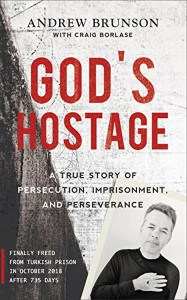
Receive Pastor Andrew Brunson's book God's Hostage for your donation of any amount!
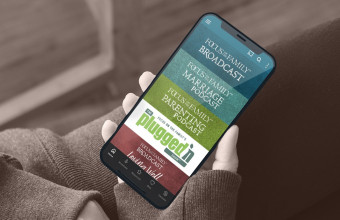
Listen to the Focus on the Family Broadcast, discover more podcasts, and find help for your family at your fingertips.

Visit our online store and purchase a CD of today's program for yourself or to share with a friend.

Focus on the Family's staff of licensed, professional counselors can help you bring healing and restoration to your family with Christian perspectives you can trust.

Connect with a global membership organization comprised of 25 national bases and one mission - to support persecuted Christians worldwide and strengthen what remains.

Your commitment to family is bringing hope to hurting marriages, offering peace to people who are searching for answers, and transforming communities one home at a time.

A conversation to have with your children about those who are suffering for their faith — when your children are ready.
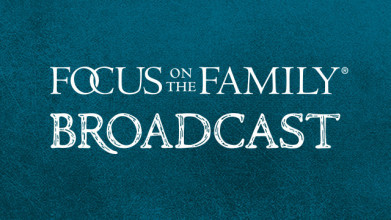
Tom Doyle and his wife, JoAnn, tell inspiring stories of bold Christians in the Middle East who have been courageously sharing their faith despite the constant risk of persecution and death.

Chad Robichaux, who served eight tours of duty in Afghanistan as a U.S. Marine, shares his perspective on the recent turbulent events in that country and describes his experiences with being part of a team that was able to help rescue nearly 12,000 stranded people.

The Rev. Johnnie Moore, an internationally-known advocate for religious freedom, describes the dangerous plight faced by Christ-followers living in nations hostile to Christianity.

How can pain and suffering be good? It seems whenever Christians talk about this subject, someone always quotes Romans 8:28. Is this verse literally true?

There's no place like home, right? Just as home brings a sense of belonging, rest, and security, so does a personal relationship with Jesus Christ. If you don't have one, this booklet can show you how to find your place in God's eternal family.
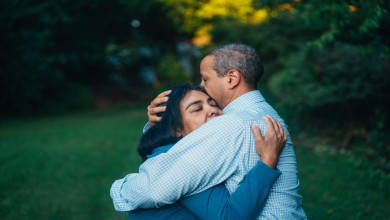
We’ve all been hurt by someone and it’s not easy to forgive. But the Bible tells us that it needs to happen. Here are four thoughts to help you on the road to forgiveness.

This discussion offers a preview of Volume #16 “Cultures in Conflict” from the That The World May Know video series, available below.

Debra Fileta will help couples better understand the four seasons of healthy relationships, what to expect during each one, and how to carefully navigate them for a stronger marriage. (Part 1 of 2)
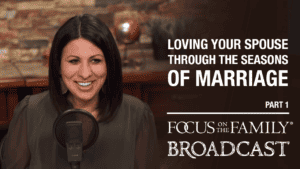
Debra Fileta will help couples better understand the four seasons of healthy relationships, what to expect during each one, and how to carefully navigate them for a stronger marriage. (Part 1 of 2)

Larnelle Harris shares stories about how God redeemed the dysfunctional past of his parents, the many African-American teachers who sacrificed their time and energy to give young men like himself a better future, and how his faithfulness to godly principles gave him greater opportunities and career success than anything else.

Amy Carroll shares how her perfectionism led to her being discontent in her marriage for over a decade, how she learned to find value in who Christ is, not in what she does, and practical ways everyone can accept the messiness of marriage and of life.

Jonathan McKee offers parents practical advice and encouragement in a discussion based on his book If I Had a Parenting Do Over: 7 Vital Changes I’d Make.